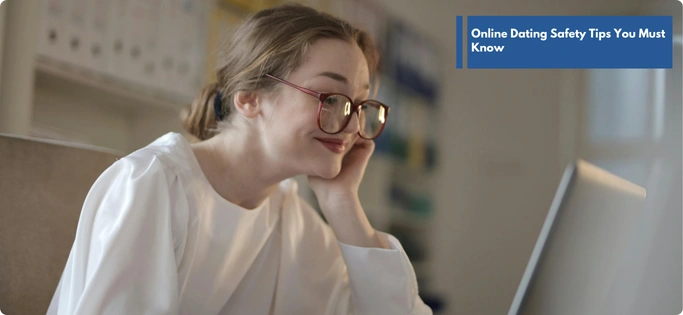Online dating safety tips make you aware of dangers like catfishing, financial scams, identity theft, stalking, and emotional manipulation. Protect yourself by verifying identities, meeting in public places, and trusting your instincts.
The world of online dating has revolutionized how we connect with potential partners. However, this digital landscape is not without its perils. As more people turn to dating apps and websites, it’s crucial to be aware of the potential dangers lurking behind those carefully curated profiles. This comprehensive guide covers 20 Essential Online Dating Safety Tips You Must Know to ensure your safety and well-being in the virtual dating world.
Advantages and disadvantages of the internet
| Advantages | Disadvantages |
|---|---|
| 1. Access to vast information | 1. Information overload and misinformation |
| 2. Global communication | 2. Privacy concerns and data breaches |
| 3. E-commerce and online shopping | 3. Cybercrime and online scams |
| 4. Remote work and education | 4. Digital addiction and time-wasting |
| 5. Entertainment and streaming services | 5. Cyberbullying and online harassment |
| 6. Improved collaboration and productivity | 6. Job displacement due to automation |
| 7. Innovation and technological advancements | 7. Digital divide and inequality |
1. Catfishing: The Art of Deception
Catfishing remains one of the most prevalent dangers in online dating. This practice involves creating a fake online persona to lure unsuspecting individuals into emotional relationships. Catfishers often use romance scammer photos to make their profiles more appealing. To protect yourself:
- Verify your match’s identity through video calls or social media
- Be wary of profiles that seem too perfect or have inconsistent information
- Trust your instincts if something feels off
2. Financial Scams: When Love Costs Money
Romance scams are a significant concern in the online dating world. Scammers prey on lonely individuals, building trust over time before requesting money for various emergencies or investments. Remember:
- Never send money to someone you haven’t met in person
- Be cautious of anyone asking for financial assistance early in the relationship
- Research common romance scam tactics to stay informed.
3. Identity Theft: Protecting Your Personal Information
Online dating platforms can be goldmines for identity thieves. Be cautious about the information you share on your profile and in private conversations. To minimize risk:
- Use a separate email address for dating sites
- Avoid sharing sensitive personal details like your full name, address, or financial information
- Be wary of matches who ask for too much personal information too quickly
4. Stalking and Harassment: When Online Connections Go Too Far
The ease of access to personal information online can lead to stalking and harassment. To protect yourself:
- Use privacy settings on dating apps to control who can see your profile
- Be cautious about sharing your location or daily routines
- Block and report any users who make you feel uncomfortable
5. Emotional Manipulation: The Dark Side of Digital Romance
Online relationships can sometimes become toxic or manipulative. Be aware of:
- Love bombing (excessive affection early on)
- Gaslighting (making you doubt your perceptions)
- Guilt-tripping or emotional blackmail
If you suspect your online relationship is toxic, it’s crucial to prioritize your mental health and well-being. That is another great commandment of online dating safety tips you must know.
6. Misrepresentation: When Reality Doesn’t Match the Profile
While not as severe as catfishing, many users misrepresent themselves on dating platforms. This can lead to disappointment and wasted time. To avoid this:
- Set realistic expectations
- Look for consistency in communication and profile information
- Consider video chatting before meeting in person
7. Privacy Breaches: When Your Data Falls into the Wrong Hands
Dating sites store sensitive personal information, making them attractive targets for hackers. To protect your privacy:
- Use strong, unique passwords for each dating platform
- Be cautious about linking your dating profile to other social media accounts
- Regularly review the privacy policies of the dating sites you use
8. Sexual Predators: A Serious Threat to Personal Safety
Unfortunately, some individuals use online dating platforms to target vulnerable people for sexual exploitation. To stay safe:
- Always meet in public places for first dates
- Tell a friend or family member about your plans
- Trust your instincts and leave immediately if you feel uncomfortable
9. Ghosting: The Emotional Toll of Sudden Silence
While not a physical danger, ghosting can have significant emotional impacts. Be prepared for the possibility that matches may suddenly cease communication, and remember that it’s often a reflection of their issues, not yours.
10. Addiction to Dating Apps: When Swiping Becomes Compulsive
The gamification of dating apps can lead to addictive behaviors. Set boundaries for your app usage and remember that real connections often require time and effort beyond the digital realm.
11. Unrealistic Expectations: The Paradox of Too Many Choices
The vast number of potential matches on dating platforms can lead to decision paralysis or a constant search for the “perfect” match. Remember that successful relationships require compromise and effort.
12. Time Wasters and Pen Pals: When Online Chats Never Lead to Real Dates
Some users on dating platforms have no intention of meeting in person. To avoid wasting time:
- Be clear about your intentions from the start
- Suggest meeting in person (safely) after establishing a good rapport
- Move on if the other person continually avoids real-world meetups
13. Exposure to Explicit Content: Unsolicited and Unwelcome Advances
Many users, particularly women, face harassment in the form of unsolicited explicit messages or images. To protect yourself:
- Use platforms with strong anti-harassment policies
- Block and report users who send inappropriate content
- Consider using apps that allow women to make the first move
14. Fake Profiles and Bots: Navigating the Sea of Inauthenticity
Some dating platforms use fake profiles or bots to boost their user numbers. Learn to recognize signs of fake profiles, such as overly professional photos, lack of profile details, or scripted responses.
15. Scams Targeting Specific Demographics: Age, Religion, and More
Certain scams target specific groups, such as older adults or members of particular religious communities. Be aware of scams that may be tailored to your demographic and exercise extra caution.
16. Revenge Porn and Blackmail: The Risks of Sharing Intimate Content
Never share intimate photos or videos with online matches, no matter how trustworthy they seem. These can be used for blackmail or shared without your consent.
17. Psychological Impact: When Online Rejection Takes a Toll
Repeated rejection or negative experiences on dating apps can impact self-esteem and mental health. Remember that online dating is just one avenue for meeting people and doesn’t define your worth.
18. Difficulty in Gauging Chemistry: When Online Sparks Don’t Translate
Sometimes, great online chemistry doesn’t translate to real-world connections. Don’t invest too much emotionally before meeting in person, and be open to the possibility that in-person dynamics may differ.
19. Cultural Misunderstandings: Navigating Global Connections
As online dating allows for connections across cultures, be aware of potential misunderstandings due to cultural differences. Approach cross-cultural matches with an open mind and willingness to learn.
20. Overexposure: When Your Dating Life Becomes Public Knowledge
Be cautious about how much of your dating life you share on social media or with your social circle. Overexposure can lead to judgment, unwanted advice, or complications in future relationships.
Final Thought
Online dating opens the door to exciting opportunities for connection, but staying safe should always come first. By following these online dating safety tips, you can enjoy the experience while minimizing risks. Whether you’re exploring online dating tips for 2025 or seeking timeless safety tips for online dating, the key is to stay informed and proactive. These practical dating safety tips ensure that you can approach each interaction with confidence and awareness. Prioritize your well-being and keep this 2025 dating safety advice in mind as you navigate the digital world of dating.
Frequently Asked Questions
- What are the most dangerous dating sites? While no site is entirely risk-free, be cautious of newer, less established platforms with weak security measures and vetting processes.
- What are some scary facts about online dating? Studies show that over 50% of online daters lie on their profiles, and romance scams cost victims millions annually.
- What are the pros and cons of online dating? Pros include increased access to potential partners and convenience, while cons include safety risks and the potential for misrepresentation.
- Are there any benefits of online dating? Yes, benefits include meeting people outside your usual social circle and the ability to filter matches based on specific criteria.
- What are the dangers of online dating statistics? Recent statistics show that 55% of online daters have experienced some form of threat or problem while using dating platforms.
- Is online dating ruining romance? While online dating has changed the dating landscape, it hasn’t inherently ruined romance. It’s a tool that can be used positively or negatively.
- What is the success rate of online dating? Success rates vary, but studies suggest that about 20% of current committed relationships began online.
- Is online dating bad for mental health? It can be if not approached mindfully. Excessive use, rejection, and comparison can negatively impact self-esteem and mental well-being.
- Why do people fail at online dating? Common reasons include unrealistic expectations, poor profile presentation, and inability to transition from online to offline connections.
- What is the paradox of online dating? The paradox refers to the abundance of choices leading to difficulty in making decisions and committing to one person.










